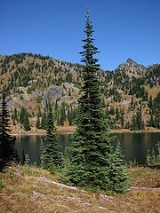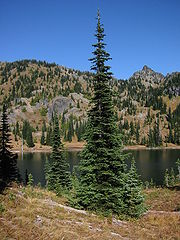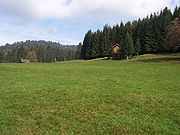
Subalpine
Encyclopedia
The subalpine zone is the biotic zone
immediately below tree line around the world. Species that occur in this zone depend on the location of the zone on the Earth, for example, Snow Gum in Australia
, or Subalpine Larch
, Mountain Hemlock
and Subalpine Fir
in western North America
.
Trees in the subalpine zone often become krummholz
, that is, crooked wood, stunted and twisted in form. At treeline, tree seedlings may germinate on the lee side of rocks and grow only as high as the rock provides wind protection. Further growth is more horizontal than vertical, and additional rooting may occur where branches contact the soil. The resulting low growth of dense trees is called krummholz
. Snow cover may protect krummholz trees during the winter, but branches higher than wind-shelters or snow cover are usually destroyed. Well-established krummholz trees may be several hundred to a thousand years old.
Montane grasslands and shrublands
may be found in the subalpine zone. Tuolumne Meadows
in the Sierra Nevada of California
, USA, is an example of a subalpine meadow.


Life zone
The Life Zone concept was developed by C. Hart Merriam in 1889 as a means of describing areas with similar plant and animal communities. Merriam observed that the changes in these communities with an increase in latitude at a constant elevation are similar to the changes seen with an increase in...
immediately below tree line around the world. Species that occur in this zone depend on the location of the zone on the Earth, for example, Snow Gum in Australia
Australia
Australia , officially the Commonwealth of Australia, is a country in the Southern Hemisphere comprising the mainland of the Australian continent, the island of Tasmania, and numerous smaller islands in the Indian and Pacific Oceans. It is the world's sixth-largest country by total area...
, or Subalpine Larch
Subalpine Larch
Larix lyallii, the Subalpine Larch, or simply Alpine Larch, is a coniferous tree native to northwestern North America. It lives at very high altitudes in the Rocky Mountains of Idaho, Montana, British Columbia, and Alberta...
, Mountain Hemlock
Mountain Hemlock
Tsuga mertensiana, known as Mountain Hemlock, is a species of hemlock native to the west coast of North America, with its northwestern limit on the Kenai Peninsula, Alaska, and its southeastern limit in northern Tulare County, California....
and Subalpine Fir
Subalpine Fir
The Subalpine Fir or Rocky Mountain Fir is a western North American fir, native to the mountains of Yukon, British Columbia and western Alberta in Canada; southeastern Alaska, Washington, Oregon, Idaho, western Montana, Wyoming, Utah, Colorado, New Mexico, Arizona, northeastern Nevada, and the...
in western North America
North America
North America is a continent wholly within the Northern Hemisphere and almost wholly within the Western Hemisphere. It is also considered a northern subcontinent of the Americas...
.
Trees in the subalpine zone often become krummholz
Krummholz
Krummholz or Krumholtz formation — also called Knieholz — is a particular feature of subarctic and subalpine tree line landscapes. Continual exposure to fierce, freezing winds causes vegetation to become stunted and deformed...
, that is, crooked wood, stunted and twisted in form. At treeline, tree seedlings may germinate on the lee side of rocks and grow only as high as the rock provides wind protection. Further growth is more horizontal than vertical, and additional rooting may occur where branches contact the soil. The resulting low growth of dense trees is called krummholz
Krummholz
Krummholz or Krumholtz formation — also called Knieholz — is a particular feature of subarctic and subalpine tree line landscapes. Continual exposure to fierce, freezing winds causes vegetation to become stunted and deformed...
. Snow cover may protect krummholz trees during the winter, but branches higher than wind-shelters or snow cover are usually destroyed. Well-established krummholz trees may be several hundred to a thousand years old.
Montane grasslands and shrublands
Montane grasslands and shrublands
Montane grasslands and shrublands is a biome defined by the World Wildlife Fund. The biome includes high altitude grasslands and shrublands around the world....
may be found in the subalpine zone. Tuolumne Meadows
Tuolumne Meadows
Tuolumne Meadows is a gentle, dome-studded sub-alpine meadowy section of the Tuolumne River, in the eastern section of Yosemite National Park. Its approximate location is . Its approximate elevation is 8619 feet .-Natural History:...
in the Sierra Nevada of California
California
California is a state located on the West Coast of the United States. It is by far the most populous U.S. state, and the third-largest by land area...
, USA, is an example of a subalpine meadow.

Subalpine species
- Bristlecone pineBristlecone pineThe bristlecone pines are a small group of pine trees that are thought to reach an age far greater than that of any other single living organism known, up to nearly 5,000 years....
- CraspediaCraspediaCraspedia is a genus of daisies commonly known as billy buttons or woollyheads. They are native to Australia and New Zealand where they grow in a variety of habitats from sea level to the alps. The genus is found in every state of Australia except the Northern Territory. In New Zealand, Craspedia...
- Dactylorhiza viridisFrog OrchidThe Frog Orchid, or Coeloglossum viride, also known as the Long-Bracted Green Orchid and Dactylorhiza viridis is a monotypic genus of the family Orchidaceae generally found within the palearctic ecozone throughout the mid to northern United States through Canada, and in the British Isles and parts...
- DracophyllumDracophyllumDracophyllum is a genus of plants belonging to the family Ericaceae, formerly Epacridaceae. There are some one hundred or so species in the genus, mostly shrubs but also cushion plants and trees, found in New Zealand, Australia and New Caledonia. The name, Dracophyllum or Dragon-leaf refers to...
- Erysimum baeticumErysimum baeticumErysimum baeticum is an annual to perennial herb endemic to some mountains in the SE of Spain. This species has two subspecies: Erysimum baeticum bastetanum is found only in the Sierra de Baza , inhabiting the subalpine pine forests, from 1500 to 2000 m. a.s.l....
- Foxtail pineFoxtail PineThe Foxtail Pine is a rare pine that is endemic to California, United States, where it is found in two areas with a separate subspecies in each, the typical subsp. balfouriana in the Klamath Mountains, and subsp. austrina in the southern Sierra Nevada.-Description:Foxtail Pine is a tree to tall,...
- Limber pineLimber PineThe Limber Pine, Pinus flexilis, is a species of pine tree-the family Pinaceae that occurs in the mountains of the Western United States, Mexico, and Canada. It is also called Southwestern White Pine and Rocky Mountain White Pine...
- Mountain HemlockMountain HemlockTsuga mertensiana, known as Mountain Hemlock, is a species of hemlock native to the west coast of North America, with its northwestern limit on the Kenai Peninsula, Alaska, and its southeastern limit in northern Tulare County, California....
- Mountain Hemlock
- Rocky Mountain Douglas-firRocky Mountain Douglas-firThe Rocky Mountain Douglas-fir, Pseudotsuga menziesii subsp. glauca, is an evergreen conifer native to the interior mountainous regions of western North America, from central British Columbia and southwest Alberta in Canada southward through the United States to the far north of Mexico...
- Subalpine FirSubalpine FirThe Subalpine Fir or Rocky Mountain Fir is a western North American fir, native to the mountains of Yukon, British Columbia and western Alberta in Canada; southeastern Alaska, Washington, Oregon, Idaho, western Montana, Wyoming, Utah, Colorado, New Mexico, Arizona, northeastern Nevada, and the...
- Subalpine LarchSubalpine LarchLarix lyallii, the Subalpine Larch, or simply Alpine Larch, is a coniferous tree native to northwestern North America. It lives at very high altitudes in the Rocky Mountains of Idaho, Montana, British Columbia, and Alberta...
- Subalpine Fleabane
- Subalpine LarchSubalpine LarchLarix lyallii, the Subalpine Larch, or simply Alpine Larch, is a coniferous tree native to northwestern North America. It lives at very high altitudes in the Rocky Mountains of Idaho, Montana, British Columbia, and Alberta...
- Subalpine warblerSubalpine WarblerThe Subalpine Warbler, Sylvia cantillans, is a small typical warbler which breeds in the southernmost areas of Europe and northwest Africa. This small passerine bird is migratory, and winters along the southern edge of the Sahara...
- Vipera dinnikiVipera dinnikiVipera dinniki is a venomous viper species found in Russia, Georgia and Azerbaijan. No subspecies are currently recognized.-Description:Of the 49 Russian specimens examined by Orlov and Tuniyev , 29 were males and the largest measured 41.2 cm...
- Whitebark pineWhitebark PinePinus albicaulis, known commonly as Whitebark Pine, Pitch Pine, Scrub Pine, and Creeping Pine occurs in the mountains of the Western United States and Canada, specifically the subalpine areas of the Sierra Nevada, the Cascade Range, the Pacific Coast Ranges, and the northern Rocky Mountains –...
- White-tailed ptarmiganWhite-tailed PtarmiganThe White-tailed Ptarmigan, Lagopus leucura, is the smallest bird in the grouse family. It is found in the mountains of the western United States, Canada and Alaska.-Description:...
Examples of subalpine zones

- Australian Alps montane grasslandsAustralian Alps montane grasslandsThe Australian Alps montane grasslands is a montane grassland ecoregion of south-eastern Australia, restricted to the montane regions above 1300 metres .-Location and description:...
- Eastern Himalayan subalpine conifer forestsEastern Himalayan subalpine conifer forestsThe Eastern Himalayan subalpine conifer forests is a temperate coniferous forests ecoregion which is found in the middle and upper elevations of the eastern Middle Himalayas, in western Nepal, Bhutan and northern Indian states including Arunachal Pradesh....
- Western Himalayan subalpine conifer forestsWestern Himalayan subalpine conifer forestsThe Western Himalayan subalpine conifer forests is a temperate coniferous forests ecoregion of the middle and upper elevations of the western Middle Himalayas of Nepal, India, and Pakistan.-Setting:...
- Hengduan Mountains subalpine conifer forests
- French PrealpsFrench PrealpsThe French Prealps are a group of subalpine mountain ranges of medium elevation located immediately west of the French Alps. They roughly stretch from Lake Geneva southwest to the Isère and Drôme Rivers; east to a line running from Chamonix, to Albertville, to Grenoble, to Gap, to Barcelonette;...
- Sierra Nevada subalpine zoneSierra Nevada subalpine zoneThe Sierra Nevada subalpine zone refers to a biotic zone below treeline in the Sierra Nevada mountain range of California, United States. This subalpine zone is positioned between the upper montane zone at its lower limit, and tree line at its upper limit.The Sierra Nevada subalpine zone occurs...
- Rocky Mountains subalpine zone
Related articles
- Alpine zone
- Montane zone
- Montane grasslands and shrublandsMontane grasslands and shrublandsMontane grasslands and shrublands is a biome defined by the World Wildlife Fund. The biome includes high altitude grasslands and shrublands around the world....
- Climate of the AlpsClimate of the AlpsThe climate of the Alps is the climate, or average weather conditions over a long time, of the exact middle Alpine region of Europe. As air rises from sea level to the upper regions of the atmosphere the temperature decreases...
- Tree line

